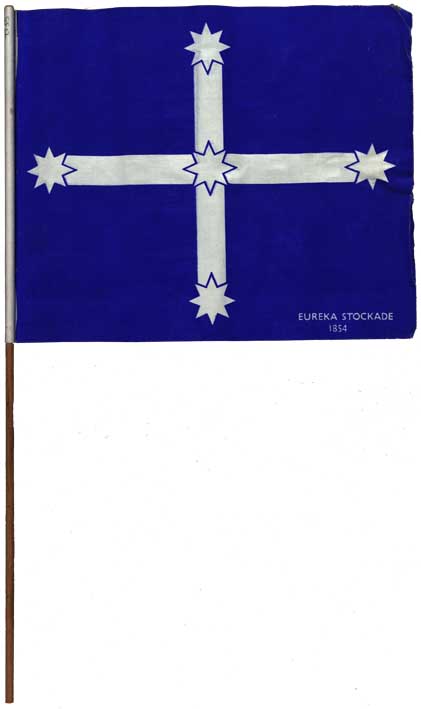Eureka 100, 1954
- FOR CENTURY A SYMBOL OF RESISTANCE TO OPPRESSION HERALD MAGAZINE SECTION
- An artist's impression of the arrival of troops from Melbourne to put down the "revolt."
- 15 Minutes Of History At Eureka Stockade By A STAFF CORRESPONDENT
- THE SPECIAL pony express had never made such haste, but the stunning news of the battle 75 miles away at Ballarat at dawn on Sunday, December 3, 1854, was more than a day old before it reached Melbourne.
- "A FEARFUL affray...it still seems incredible," a Melbourne newspaper commented.
- The rebel "Republic of Victoria," with its flag of blue bearing the stars of the Southern Cross in white, was soon forgotten, but for a hundred years the Eureka Stockade has lived as a symbol of resistance to oppreslion.
- The Eureka Stockade has been the subject of novels, poems, plays, songs, a film, and historical studies.
- The leader of the "Republic," Peter Lalor, is commemorated in the Lalor Federal electoral division near Ballarat, which is arranging celebrations of the centenary at its Eureka Stockade Memorial.
- THE elements of the rebellion included:
- 'An inequitable system of compelling gold diggers, both successful and unsuccessful, to pay a licence fee of £1 a month, and the arrogance of the police who collected the fees.
- A corrupt magistrate.
- The diggers, strongly bound together by mateship, rioted in October and burnt down the Eureka Hotel because a magistrate had acquitted the hotel keeper, who was his friend, of a charge of murdering a digger. The Government dismissed the magistrate, and ordered the rearrest of the hotelkeepcr, whom a Court convicted of manslaughter. But this did not end the clashes between a tactless administration and the licence-hounded diggers. The diggers formed the Ballarat Reform League. They publicly burnt the licences, and the Government sent troops to Ballarat.
- As a detachment of the 40th Regiment neared Ballarat on November 28, cries of "Joe! Joe!" rallied the diggers. TWO diggers asked the officer in command, Captain Wise, if the waggons he had with him contained guns.
- "I have no information to give to a parcel of rebels," Wise replied contemptuously.
- The angered mob captured a waggon, overturned another, and put the troops to flight. Mounted police, who came to the rescue of the troops, rode through the mob, slashing with their swords and wounding many.
- The diggers, at meetings which as many as 12,000 attended, decided to defend themselves. They elected as their leader Peter Lalor, a tall, articulate, commanding Irishman, 27 years old.
- For a drill ground they fenced off and fortified with earth, rock and logs an acre of land on an area known as the Eureka Lead.
- Lalor and his four lieutenants, two of them foreigners, proclaim-ed the "Republic of Victoria." SAID Lalor to the diggers: "It is my duty now to swear you in . . . The man who, after this solemn oath, does not stand by our standard is a coward at heart."
- About 500 diggers took the oath: "We swear by the Southern Cross to stand truly by each other and fight to defend our rights and liberties."
- A newspaper correspondent, reported the climax on December 3: "This holy morning has been ushered, in with a scene of carnage and death.
- "From what I can learn, the whole strength of the camp, less such as was necessary for guard, etc., was marched up to Eureka where some of the volunteers had thrown up a barricade; this place was attacked and carried by the military . . .
- "I found the military and troopers returning to the camp with a large number of prisoners, and some wounded and dead soldiers . . . The 'Australian flag' used at the late meeting was carried past in triumph . . ."
- The battle lasted only 15 minutes. The soldiers and police numbered 276 and the rebels about 130. Five soldiers, including Captain Wise, and about 30 rebels were killed.
- A bullet shattered the bone of Lalor's left arm at the shoulder. Diggers hid him among some slabs and later took him to the bush. The next day two doctors amputated his arm.
- THE Government put a price on Lalor but no one betrayed him. It prosecuted 13 insurgents but lost every case.
- Only two enthusiastic spectators at the court received punishment. Their cheers at the verdicts brought them a week's gaol for contempt of court.
- After the failure of the trials, Lalor returned to Ballarat. Within a year he became a miners' representative in the Legislative Council. Lalor spent the rest of his life in politics, was Speaker of the Victorian Parliament, and refused a knighthood.
- When he retired in 1888 he received a grant of £.4,000 in recognition of his services.[1]
References
- ↑ Sydney Morning Herald, 4 December 1954
